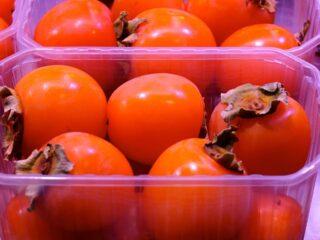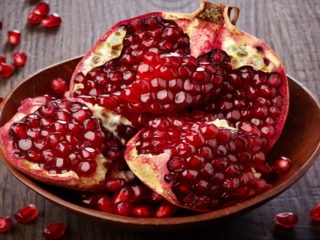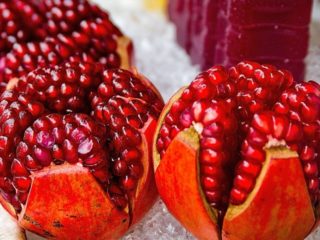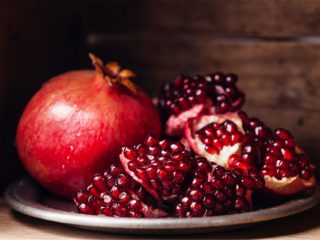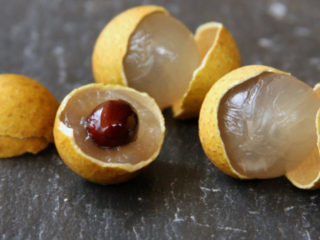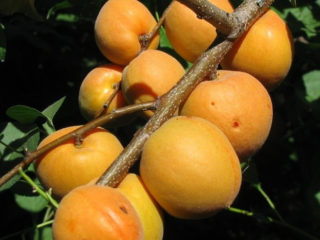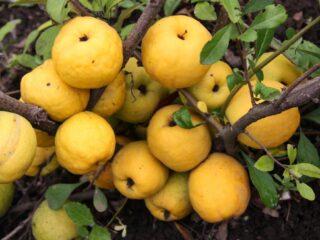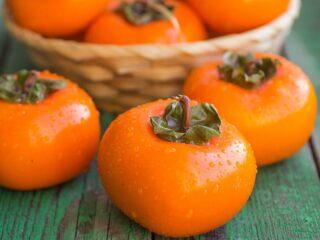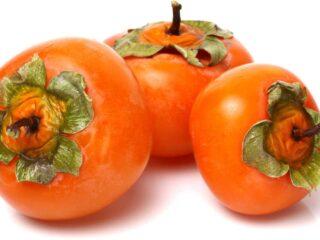Content
- 1 What is dried persimmon called?
- 2 What is the difference between dried persimmons and fresh ones?
- 3 How many calories are in dried persimmons?
- 4 What are the benefits of dried (dried) persimmon?
- 5 How to properly eat dried persimmons
- 6 Are dried persimmons washed before eating?
- 7 Use of dried persimmon in medicine
- 8 The use of dried persimmons in cooking
- 9 Harm and contraindications
- 10 How to choose dried (dried) persimmons
- 11 Conclusion
Dried persimmon is a healthy product that retains all the properties of fresh berries. You can buy it at the store or prepare it yourself. Before use, the pieces are washed and, if necessary, softened in warm water. Used for making drinks, as well as in folk medicine (internally and externally).
What is dried persimmon called?
Dried persimmon is a product of processing fresh fruits, which is obtained by drying or drying in the open air or in a ventilated area. In many southern countries, for example, in Georgia, dried persimmons are called “chiri”. This is a popular sweet snack served on the New Year's table.
Dried and dried persimmons are often considered the same product, which is partly true. They differ only in the preparation technology: the dried one is placed in the oven, and the dried one is hung from the ceiling in a ventilated room or outside under a canopy.At the same time, the dried product is stored for up to 2 years, and the dried product - up to 3 (in a cool, dry and dark place).
What is the difference between dried persimmons and fresh ones?
Compared to fresh persimmons, dried fruits look different. A white coating appears on their surface - this is sugar, indicating the good quality of the product. There are other differences:
- high calorie content – 4 times more;
- rich taste with noticeable sweetness;
- pronounced aroma;
- the consistency is denser, although not too hard;
- shelf life up to three years (for fresh fruit up to six months in the cellar).
How many calories are in dried persimmons?
The calorie content of dried persimmon per 100 grams of the finished product is 303 kcal, i.e. this is a high-calorie product. For comparison: the pulp of fresh or frozen fruit contains 67 kcal for the same weight. This is explained by the fact that during drying or drying, the pulp loses water, which makes up a significant part of the weight and does not contain any calories.
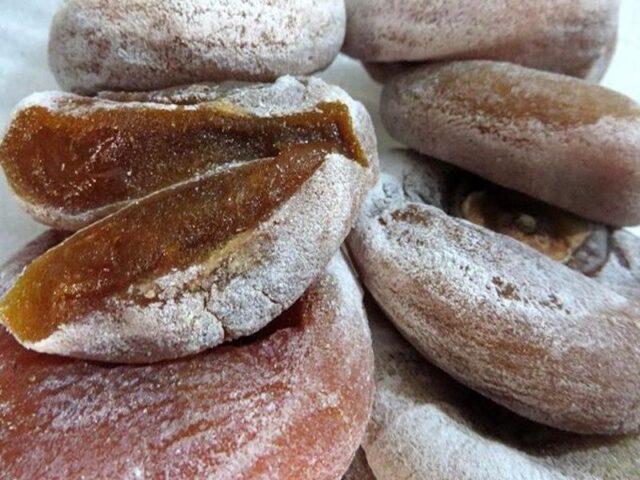
Dried persimmon fruits are covered with a sugar coating
Nutritional value (per 100g):
- proteins – 1.4 g;
- fats – 0.6 g;
- carbohydrates – 73 g.
The dried product should be consumed with caution, since the calorie content of 100 g is equivalent to one full meal. Moreover, all carbohydrates that make up the fruit are simple. They quickly provide energy, but do not saturate the body for a long time. Within an hour you will feel hungry again.
What are the benefits of dried (dried) persimmon?
The benefits of dried persimmon for women and men are determined by its rich chemical composition. Due to the fact that drying is done under gentle conditions (at a low temperature), almost all useful substances are preserved in the pulp:
- macroelements (potassium, phosphorus, sodium);
- trace elements (magnesium, iron, manganese, iodine);
- vitamins (C, P, E, A, group B, beta-carotene);
- organic acids (citric, malic, betulinic);
- cellulose;
- pectins;
- simple carbohydrates (sucrose, glucose).
If you regularly consume dried persimmons, you can not only saturate your body with energy (use as a snack in limited quantities), but also get the necessary vitamins and other substances. This benefits the human body. Reception of persimmon:
- enhances metabolism;
- neutralizes the effect of alcohol (ethyl alcohol);
- improves digestion;
- reduces bleeding (for hemorrhoids);
- restores vascular tone and normalizes heart function;
- removes harmful components, including metabolic reaction products and toxins;
- improves blood circulation (prevention of anemia);
- strengthens the immune system.
The fruits have the following properties:
- anti-inflammatory;
- anti-oncological (thanks to rare betulinic acid);
- antiseptic (for the treatment of skin diseases).
The benefits of dried persimmons for a woman’s body have also been studied. For example, thanks to regular consumption of this product, you can quickly saturate the body with energy so as not to overload with extra calories before the main meal. In addition, persimmon promotes healthy nails, hair and skin.
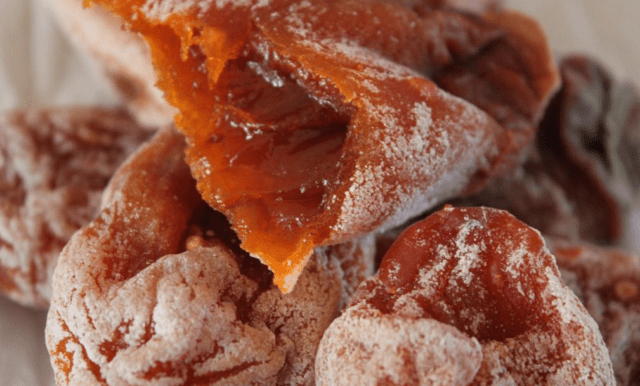
Dried persimmon is a healthy but high-calorie product
Another positive property is that the fruits help cope with swelling during late pregnancy. Therefore, they can be consumed in moderation (in the absence of contraindications such as diabetes and allergies).
Persimmon can be used for cosmetic masks. To do this, it is better to take not dried pulp, but unripe fruits, which have a noticeably astringent taste.The pulp is crushed, mixed with egg yolk and a few drops of lemon juice and applied to the face for 30 minutes.
How to properly eat dried persimmons
If the berry was recently harvested, its consistency is quite soft. Therefore, you can eat it without pre-soaking. But most often dried persimmons need to be softened. To do this, place it in warm water (40–50 degrees) for 40–60 minutes (fill in so as to just cover the surface). If you have time, you can leave it overnight, covered with a plate. Then the pulp will become very soft and will not lose its taste and aroma.
You can also soak dried persimmons for baking. If you cook compote or another drink, there is no need to do this - the pieces will still soften during the cooking process.
Are dried persimmons washed before eating?
If the product is well packaged and especially prepared yourself, it is not necessary to wash it. But if you are not sure, it is better to rinse under running water or lightly rinse with boiling water. This method allows you to destroy almost all bacteria and other dangerous microorganisms.
Use of dried persimmon in medicine
In folk medicine, the product is used to cleanse the intestines, improve digestion, and as an expectorant. Despite their high calorie content, dried fruits are also used in dietetics: they replace breakfast or add pieces to oatmeal along with figs, dates and other dried fruits.
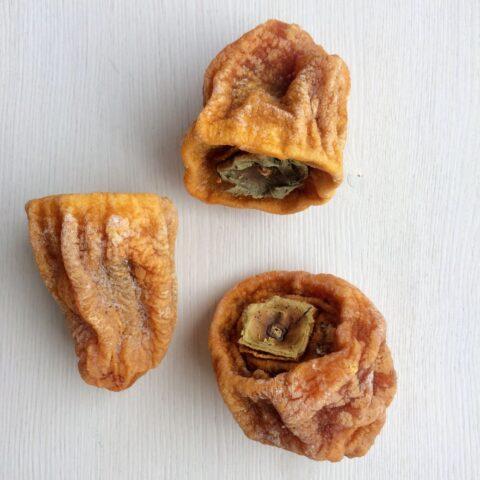
Dried persimmons can be used to treat diarrhea, sore throat and colds
There are several recipes for treating diseases:
- For diarrhea, take 100 g of pulp and boil it in 500 ml of water. After boiling, stand for 30 minutes on low heat. Drink the entire portion per day, in equal doses of half a glass.
- For colds and sore throats, take 100 g of pulp, add warm water to soften it, then turn it into a pulp using a blender or meat grinder. Add a little water and strain. You need to gargle with this extract 4-5 times a day.
- To treat boils and ulcers, several pieces are softened, turned into a paste and placed on the affected area. Cover the top with cotton wool and bandage it for 5–6 hours.
The use of dried persimmons in cooking
Most often, the dried product is not used in its pure form, but for the preparation of compotes. The classic recipe requires 3 ingredients:
- water – 2 l;
- dried persimmon – 900 g;
- sugar – 200–300 g.
Step-by-step instruction:
- Pour cold water, add sugar.
- Bring to a boil over low heat.
- Cut the fruits into equal pieces and add to the water while boiling.
- Cook over moderate heat for 7 minutes.
- Cover with a lid and let sit until completely cool.
For the holiday, you can prepare a warming drink based on the following ingredients:
- water – 1.5 l;
- dried persimmon – 700 g;
- lemons – 2 pcs.;
- rum – 500 ml (less is possible);
- ground ginger – 10 g;
- carnation – 5 flowers;
- sugar – 200 g;
- cinnamon – 1-2 sticks.
The cooking instructions are as follows:
- Place sugar in water and bring to a boil.
- Add cloves, cinnamon, ginger and pre-prepared lemon zest.
- Cook the mixture over low heat for 20 minutes.
- Add rum and freshly squeezed lemon juice to the hot broth, cover with a lid and leave for 20-30 minutes.
Harm and contraindications
The main harm of this product is its high calorie content. The pulp contains substances that are allergens for some people. Therefore, use should be limited if you have:
- diabetes;
- excess weight;
- intestinal obstruction;
- chronic diseases of the pancreas (especially during exacerbation);
- recent abdominal surgery;
- allergies.
During pregnancy and lactation, the fruits are consumed with caution. Children under 3 years of age should exclude the product from their diet.

Patients with diabetes and constipation should limit their use of the product.
But even if you have diabetes, the fruit can be included in your diet in a minimal dose (for example, 50–70 g per day). The patient should monitor his condition and, at the first need, refuse dessert and consult a doctor.
How to choose dried (dried) persimmons
When purchasing a product, you should pay attention to the manufacturer and appearance:
- there should be a white coating on the surface;
- if it is easily erased, it is flour or starch - a sign of low-quality fruit;
- the consistency of dried persimmons should be like rubber (not too dry, quite soft);
- there are no dots, inclusions or other extraneous stains.
Dried persimmon fruits are stored in the refrigerator or in the basement. The room should be dark and cool, and most importantly, moderately humid. In such conditions, the shelf life will be up to 2-3 years (from the date of production), but it is better to consume within a year.
Conclusion
Dried persimmon is a healthy product that quickly saturates and energizes. The pulp contains vitamins, minerals and antioxidants. The calorie content of the fruit is very high - more than 300 kcal per 100 g. Therefore, even healthy people should limit their consumption of dried persimmons.
